Planning your PhD research: A 3-year PhD timeline example
Planning out a PhD trajectory can be overwhelming. Example PhD timelines can make the task easier and inspire. The following PhD timeline example describes the process and milestones of completing a PhD within 3 years.

Elements to include in a 3-year PhD timeline
The example scenario: completing a phd in 3 years, example: planning year 1 of a 3-year phd, example: planning year 2 of a 3-year phd, example: planning year 3 of a 3-year phd, example of a 3 year phd gantt chart timeline, final reflection.
Every successful PhD project begins with a proper plan. Even if there is a high chance that not everything will work out as planned. Having a well-established timeline will keep your work on track.
What to include in a 3-year PhD timeline depends on the unique characteristics of a PhD project, specific university requirements, agreements with the supervisor/s and the PhD student’s career ambitions.
For instance, some PhD students write a monograph while others complete a PhD based on several journal publications. Both monographs and cumulative dissertations have advantages and disadvantages , and not all universities allow both formats. The thesis type influences the PhD timeline.
Furthermore, PhD students ideally engage in several different activities throughout a PhD trajectory, which link to their career objectives. Regardless of whether they want to pursue a career within or outside of academia. PhD students should create an all-round profile to increase their future chances in the labour market. Think, for example, of activities such as organising a seminar, engaging in public outreach or showcasing leadership in a small grant application.
The most common elements included in a 3-year PhD timeline are the following:
- Data collection (fieldwork, experiments, etc.)
- Data analysis
- Writing of different chapters, or a plan for journal publication
- Conferences
- Additional activities
The whole process is described in more detail in my post on how to develop an awesome PhD timeline step-by-step .
Many (starting) PhD students look for examples of how to plan a PhD in 3 years. Therefore, let’s look at an example scenario of a fictional PhD student. Let’s call her Maria.
Maria is doing a PhD in Social Sciences at a university where it is customary to write a cumulative dissertation, meaning a PhD thesis based on journal publications. Maria’s university regulations require her to write four articles as part of her PhD. In order to graduate, one article has to be published in an international peer-reviewed journal. The other three have to be submitted.
Furthermore, Maria’s cumulative dissertation needs an introduction and conclusion chapter which frame the four individual journal articles, which form the thesis chapters.
In order to complete her PhD programme, Maria also needs to complete coursework and earn 15 credits, or ECTS in her case.
Maria likes the idea of doing a postdoc after her graduation. However, she is aware that the academic job market is tough and therefore wants to keep her options open. She could, for instance, imagine to work for a community or non-profit organisation. Therefore, she wants to place emphasis on collaborating with a community organisation during her PhD.
You may also like: Creating awesome Gantt charts for your PhD timeline
Most PhD students start their first year with a rough idea, but not a well-worked out plan and timeline. Therefore, they usually begin with working on a more elaborate research proposal in the first months of their PhD. This is also the case for our example PhD student Maria.
- Months 1-4: Maria works on a detailed research proposal, defines her research methodology and breaks down her thesis into concrete tasks.
- Month 5 : Maria follows a short intensive course in academic writing to improve her writing skills.
- Months 5-10: Maria works on her first journal paper, which is based on an extensive literature review of her research topic. At the end of Month 10, she submits the manuscript. At the same time, she follows a course connected to her research topic.
- Months 11-12: Maria does her data collection.
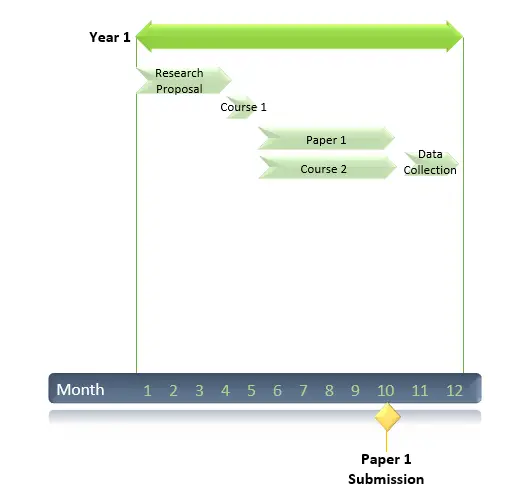
Maria completed her first round of data collection according to plan, and starts the second year of her PhD with a lot of material. In her second year, she will focus on turning this data into two journal articles.
- Months 1-2: Maria works on her data analysis.
- Months 3-7: Maria works on her second journal paper.
- Month 7: Maria attends her first conference, and presents the results of her literature-review paper.
- Month 8: Maria received ‘major revisions’ on her first manuscript submission, and implements the changes in Month 8 before resubmitting her first journal paper for publication.
- Month 9: Maria follows a course on research valorisation to learn strategies to increase the societal impact of her thesis.
- Months 9-12: Maria works on her third journal paper. She uses the same data that she collected for the previous paper, which is why she is able to complete the third manuscript a bit faster than the previous one.
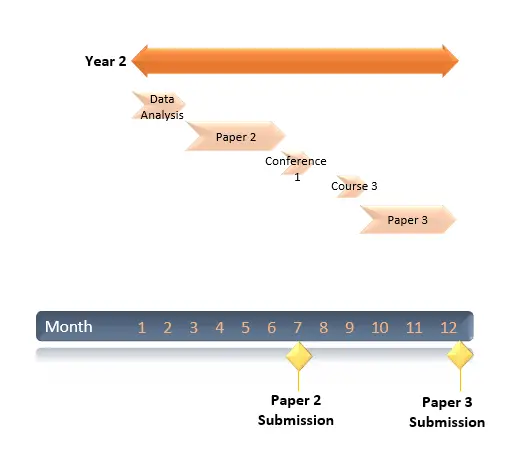
Time flies, and Maria finds herself in the last year of her PhD. There is still a lot of work to be done, but she sticks to the plan and does her best to complete her PhD.
- Month 1: Maria starts a second round of data collection, this time in collaboration with a community organisation. Together, they develop and host several focus groups with Maria’s target audience.
- Month 2: Maria starts to analyse the material of the focus group and develops the argumentation for her fourth journal paper.
- Month 3: Maria presents the results of her second journal paper at an international conference. Furthermore, she helps out her supervisor with a grant application. They apply for funding to run a small project that is thematically connected to her PhD.
- Months 4-9: Maria writes her fourth and final journal article that is required for her PhD.
- Month 10: Maria writes her thesis introduction .
- Month 11: Maria works on her thesis conclusion.
- Month 12 : Maria works on the final edits and proof-reading of her thesis before submitting it.
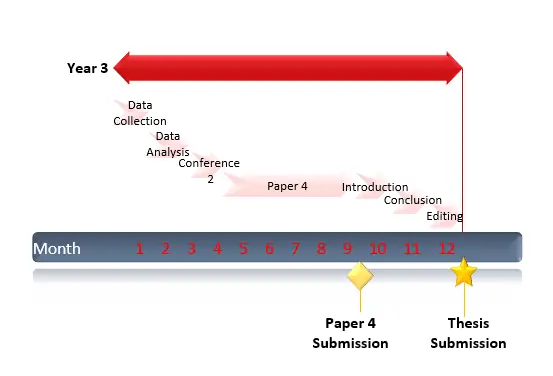
Combining the 3-year planning for our example PhD student Maria, it results in the following PhD timeline:
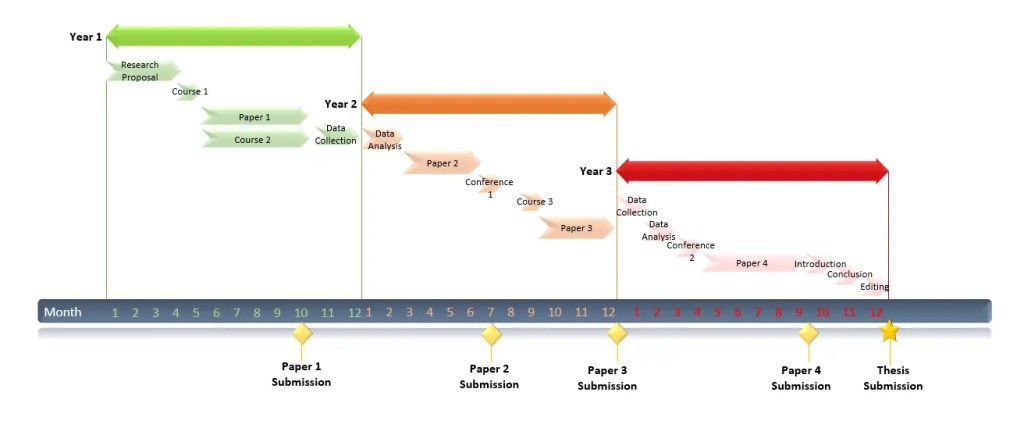
Creating these PhD timelines, also called Gantt charts, is easy. You can find instructions and templates here.
Completing a PhD in 3 years is not an easy task. The example of our fictional PhD student Maria shows how packed her timeline is, and how little time there is for things to go wrong.
In fact, in real life, many PhD students spend four years full-time to complete a PhD based on four papers, instead of three. Some extend their studies even longer.
Furthermore, plan in some time for thesis editing, which is a legitimate practice and can bring your writing to the next level. Finding a reputable thesis editor can be challenging, so make sure you make an informed choice.
Finishing a PhD in 3 years is not impossible, but it surely is not easy. So be kind to yourself if things don’t work out entirely as planned, and make use of all the help you can get.
Master Academia
Get new content delivered directly to your inbox.
Subscribe and receive Master Academia's quarterly newsletter.
10 amazing benefits of getting a PhD later in life
How to prepare your viva opening speech, related articles.

Writing a successful academic CV (and a free template)

25 short graduation quotes: Inspiration in four words or less

9 smart questions to ask a professor about graduate school

- Code of Ethics
- Dissertation Editing
- Dissertation Coaching
- Free Consultation
How to Create a Dissertation Timeline (With Examples + Tempate)
When it’s time to start thinking about writing your dissertation, it is vital to put together a dissertation timeline. This will help you map out the months you will be spending on your dissertation, and ensure that you’re staying on track. A specific and detailed dissertation timeline will serve as an outline to guide you, step by step, through what can be a long and challenging process.
While we often refer to a dissertation in a way that makes it sound like a monolith, in reality, a dissertation consists of many moving parts. A dissertation timeline includes a series of milestones that leads up to the dissertation defense , revisions, and final submission of your dissertation. Constructing an outline of every step in the dissertation process , including rough estimates of how long each will take, will give you a realistic picture of where you are in the process at any given time.
Before embarking on your dissertation, it is a good idea to meet with your dissertation advisor and sketch out a dissertation timeline that is realistic for the size and scope of your project and includes deadlines. This will provide you with much-needed structure and a sense of what will happen next. To get an idea of what a completed dissertation looks like and the components your program requires, ask to see samples from recent graduates in your department.
These are a few frequently asked questions about crafting a dissertation timeline:
- What does a dissertation timeline look like?
- What goes in a dissertation timeline?
- How structured should a dissertation timeline be?
- What do you do with a dissertation timeline?

What Does a Dissertation Timeline Look Like?
One way to think about a dissertation timeline is as a kind of outline. While the outlining process is unique to each writer, there are commonalities shared by all of them. Likewise, when writing a dissertation timeline, you’ll want to include all of the basic elements of your dissertation as well as the amount of time you think you’ll need to execute them.
The best dissertation timeline format is the one that works for you. Though I’ve reformed somewhat over the years, for a long time I wasn’t a fan of intensely detailed outlines. Many people don’t like outlines. And that’s okay! However, writing a dissertation is not the time to be flying by the seat of your pants. To get started, a simple, linear timeline that projects the amount of time you think you’ll need to write your dissertation will suffice.
Example Dissertation Timeline
Below, you’ll find an example of a dissertation timeline, which you can view as an image in your browser or download as a spreadsheet. Feel free to use the spreadsheet as a template as you build your own dissertation timeline.
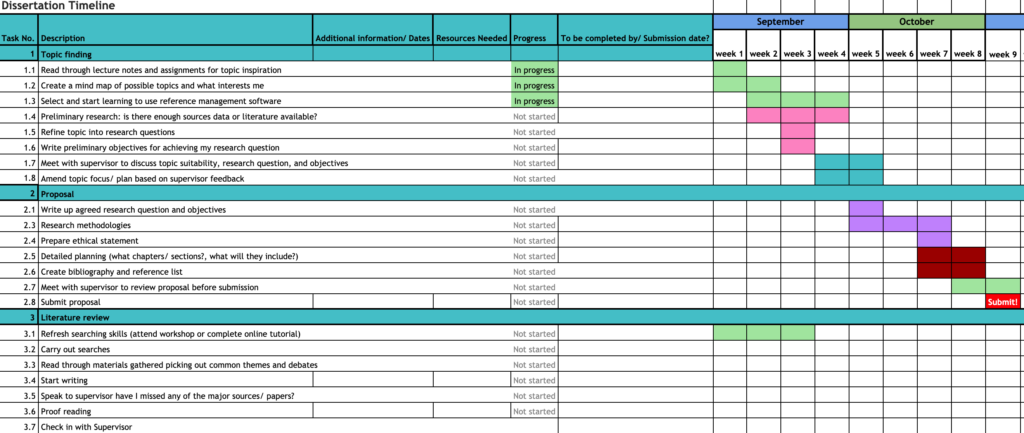
Or download the spreadsheet below:
Inclusion in a Dissertation Timeline
When constructing your dissertation timeline, include every element of the dissertation from the abstract to the conclusion. Keep in mind that you may not be writing your chapters in chronological order. For instance, after completing their first round of research and writing their research question, most graduate students will tackle their literature review next, even though it comes after the abstract and introduction in the final document.
Depending on the field being studied, most dissertations will also include sections for methodology, results, and discussion. Many programs also require a detailed conclusion that alludes to future research possibilities. Every dissertation also has an extensive list of references (pro tip: write this as you’re writing your dissertation), as well as appendices for charts, graphs, and other ephemera. And don’t forget your acknowledgments!
Dissertation Timeline Structure
The structure of your dissertation timeline will take shape once you’re engaged in the research process. While a road map may seem like an apt metaphor for a dissertation, once you get started you may notice a lot of starts and stops and circling back. After you’ve begun researching, you may realize that you need to allot more time for digging through the databases, or you may discover that you need to reformulate your research question entirely.

I’ve seen many of my own graduate students use calendars to great effect, giving themselves hard and fast deadlines to meet. Many students also build out their dissertation timelines as they progress, attaching working drafts of their abstract, introduction, and literature review to their timeline within a giant spreadsheet that links to multiple documents and sources. All of these methods are valid. Devise one that works for you.
Using a Dissertation Timeline
So once you have a thoughtful, soundly-constructed dissertation timeline, what do you do with it? First, and most importantly, try your best to adhere to it. Check in with your dissertation timeline regularly, and use it to keep yourself on track. Also, make adjustments to it as needed. If you find yourself breezing through your preliminary research but needing a bit more time for your literature review, consult your timeline and adjust accordingly.
While meeting your deadlines is important, also construct your dissertation timeline with an understanding that many graduate students face delays once they start working on their dissertation. These can include hold-ups at the department or university level in the form of late IRB approval or limited lab space or grant funding that gets cut. Anything can happen, but having a dissertation timeline will help you get back on track as soon as the storm passes.
In my own experience, I also found my dissertation timeline to be a great document to share and discuss with my dissertation chair and committee. Once I finished my comprehensive exams, I met with members of my dissertation committee and got feedback on my rough dissertation timeline to make sure my goals for submitting my dissertation and graduating were realistic. This also ensured that we were all on the same page.
When writing a dissertation, timing is everything. Creating a dissertation timeline gives you definitive time limits for research and writing, and it also influences several other major decisions that you’ll need to make. These include preparation to go on the job market, which often coincides with writing your dissertation. There is no doubt that this will be a hectic time in your graduate school career, but having a well-organized dissertation timeline is a good way to keep everything in perspective.
Related posts:

Courtney Watson, Ph.D.
Courtney Watson, Ph.D. is an Associate Professor of English at Radford University Carilion, in Roanoke, Virginia. Her areas of expertise include undergraduate and graduate curriculum development for writing courses in the health sciences and American literature with a focus on literary travel, tourism, and heritage economies. Her writing and academic scholarship has been widely published in places that include Studies in American Culture , Dialogue , and The Virginia Quarterly Review . Her research on the integration of humanities into STEM education will be published by Routledge in an upcoming collection. Dr. Watson has also been nominated by the State Council for Higher Education of Virginia’s Outstanding Faculty Rising Star Award, and she is a past winner of the National Society of Arts & Letters Regional Short Story Prize, as well as institutional awards for scholarly research and excellence in teaching. Throughout her career in higher education, Dr. Watson has served in faculty governance and administration as a frequent committee chair and program chair. As a higher education consultant, she has served as a subject matter expert, an evaluator, and a contributor to white papers exploring program development, enrollment research, and educational mergers and acquisitions.
Comments are closed.
How to Finish Your Dissertation in Half the Time
Learn how to avoid the pitfalls preventing you from finishing your dissertation faster.

Subscribe to get the free eBook!
Dr. Courtney Watson In the News
“ See It for Yourself ” in With Good Reason: Beyond the Book July 22, 2022
“ I Thought You’d Never Ask: Consent in Contemporary Romance ” in New Frontiers in Popular Romance (McFarland) June 13, 2022
- Common Errors
- Dissertation Success
- Presentation
- Quantitative Analysis
- Surviving Grad School
“How to Finish Your Dissertation in Half the Time”

How to Prepare a PhD Research Plan/Schedule?
PhD research plan is a structured schedule for completing different objectives and milestones during a given timeframe. Scholars are usually unaware of it. Let us find out how to prepare it.
Between March 2021 to 2022, I read almost 15 different research proposals from students (for their projects) and only a single one, I found, with a comprehensive research plan for 3 years. Which is still not, kind of practical, probably copied from other students.
Such entities are not known to over 90% of students, if some know that because their university asked for but unfortunately, this basic procedure lacks penetration among students. I don’t know the exact reason, but students lack a basic understanding of the research process.
Meaning, that they don’t know or perhaps don’t complete their course work needly. PhD research requires many documents, SOPs and write-ups, before even starting it. For example, a rough research plan, research proposal, initial interview, competence screening, grant proposal and so on.
However, the requirement varies among universities and thus knowledge regarding basic procedures often also varies among students. So I’m not blaming students but certainly, it is the fault of the university side, as well.
When you come up with a research proposal with a research schedule or entire plant, certainly it will create a positive image and good reputation. So it is important. But how to prepare it?
Hey, there I’m Dr Tushar, a PhD tutor and coach. In this article, we will understand how we can prepare a structured plan for the PhD research and how to execute it.
So let’s get started.
How to prepare a PhD research plan/schedule?
A PhD research plan or schedule can be prepared using the GANTT chart which includes a month, semester or year-wise planning of the entire PhD research work.
First, enlist goals and objectives.
It’s not about your research objective enlisted in your proposal. I’m talking about the objectives of your PhD. Take a look at some of the objectives.
Note that these are all the objectives that should be completed during the PhD, but not limited to a specific subject. Note you have to show how you can complete or achieve each objective during the entire tenure of your work.
And that is what the plan/schedule is all about. Next, explain the time duration. The time required to complete each goal, roughly. For example, a semester or a year to complete the course work or 4 to 8 months for completion of ethical approval.
Now two things must be known to you, at this point in time.
- First, enlist the time required to complete each objective, as aforementioned.
- Second, what goals would you complete during each semester?
For instance, course work takes a semester to complete, but during the period a scholar can also craft their PhD research title, research proposal, ethical approval and grant proposals.
Now it is also crucial to know that there is no time bound to complete goals, but it should be completed as you explained. Let’s say you can plant it for 3 years, 4 or even 5 years depending on the weightage of your work.
In summary, the answer to the question of how to prepare a research plan is,
- Enlist your goals or objectives.
- Decide the time required to complete each goal.
- Prepare a GANTT chart.
Now you have prepared zero-date planning for your research but how to present it? The answer is a GANTT chart.
GANTT chart for PhD research plan:
GANTT chart is a task manager and graphical presentation of how and how many tasks are completed or should be completed against a given time duration. Take a look at the image below.
How can you prepare one?
Open MS Excel (on Windows) or numbers (on Mac).
Enlist goals or objectives in a column.
Enlist years (duration of PhD) in a row and bifurcate them into individual semesters. You can also prepare a month-wise plan, that’s totally up to you. In my opinion, semester-wise planning is good because research is a lengthy and time-consuming process. So monthly planning would not work.
To make a chart more attractive and readable use colors, as I used. Now mark a ‘cell’ against a column and row showing the objective which you are going to complete in a semester. Take a look.
After the end of this, your GANTT chart would look like this.
You can prepare a month-wise planning, individual semester-wise planning and goal-wise planning etc. I will explain these things in upcoming articles on 5 different types of GANTT charts for PhD.
Custom writing services:
If you find difficulties in preparing a research plan, synopsis, proposal or GANTT chart. We can work on behalf of you. Our costume services are,
- Synopsis writing
- Project writing
- Research proposal writing
- Research planning and GANTT chart preparation.
You can contact us at [email protected] or [email protected] to get more information.
Wrapping up:
Planning and executing a research schedule are two different things. Oftentimes, students just prepare as per the requirements and then do work as per their convenience. Then they are stuck in one place and just work around the time.
Plan things. Make your own GANTT chart, put it on your work table or stick it on a wall so that you can see it daily. Try to achieve each goal in time. Trust me things will work and you will complete your PhD before anyone else.

Dr. Tushar Chauhan is a Scientist, Blogger and Scientific-writer. He has completed PhD in Genetics. Dr. Chauhan is a PhD coach and tutor.
Share this:

- Share on Facebook
- Share on Twitter
- Share on Pinterest
- Share on Linkedin
- Share via Email
About The Author

Dr Tushar Chauhan
Related posts.

Why is it called a Doctor of Philosophy?

Preparing for a PhD Viva
Leave a comment cancel reply.
Your email address will not be published. Required fields are marked *
Save my name, email, and website in this browser for the next time I comment.
Notify me of follow-up comments by email.
Notify me of new posts by email.
Understanding and solving intractable resource governance problems.
- In the Press
- Conferences and Talks
- Exploring models of electronic wastes governance in the United States and Mexico: Recycling, risk and environmental justice
- The Collaborative Resource Governance Lab (CoReGovLab)
- Water Conflicts in Mexico: A Multi-Method Approach
- Past projects
- Publications and scholarly output
- Research Interests
- Higher education and academia
- Public administration, public policy and public management research
- Research-oriented blog posts
- Stuff about research methods
- Research trajectory
- Publications
- Developing a Writing Practice
- Outlining Papers
- Publishing strategies
- Writing a book manuscript
- Writing a research paper, book chapter or dissertation/thesis chapter
- Everything Notebook
- Literature Reviews
- Note-Taking Techniques
- Organization and Time Management
- Planning Methods and Approaches
- Qualitative Methods, Qualitative Research, Qualitative Analysis
- Reading Notes of Books
- Reading Strategies
- Teaching Public Policy, Public Administration and Public Management
- My Reading Notes of Books on How to Write a Doctoral Dissertation/How to Conduct PhD Research
- Writing a Thesis (Undergraduate or Masters) or a Dissertation (PhD)
- Reading strategies for undergraduates
- Social Media in Academia
- Resources for Job Seekers in the Academic Market
- Writing Groups and Retreats
- Regional Development (Fall 2015)
- State and Local Government (Fall 2015)
- Public Policy Analysis (Fall 2016)
- Regional Development (Fall 2016)
- Public Policy Analysis (Fall 2018)
- Public Policy Analysis (Fall 2019)
- Public Policy Analysis (Spring 2016)
- POLI 351 Environmental Policy and Politics (Summer Session 2011)
- POLI 352 Comparative Politics of Public Policy (Term 2)
- POLI 375A Global Environmental Politics (Term 2)
- POLI 350A Public Policy (Term 2)
- POLI 351 Environmental Policy and Politics (Term 1)
- POLI 332 Latin American Environmental Politics (Term 2, Spring 2012)
- POLI 350A Public Policy (Term 1, Sep-Dec 2011)
- POLI 375A Global Environmental Politics (Term 1, Sep-Dec 2011)
Planning the timeline and progress of your doctoral dissertation (or Masters/undergraduate thesis)
One of my PhD students lamented this week with me that she had a lot to juggle (taking children to and from schools and to and from activities, etc.) and that she needed a strategy to make her research move forward. I had been planning to write this blog post for a while, since this is the one question I get asked the most by doctoral students (“ how do I plan my unstructured time over the summer ” being the other one).
Do you have one like this but for dissertations? From how to pick your topic to how to plan your chapters or something similar? 🙂 — Mariana Miguélez (@Scherezadda) March 27, 2018
I had to rush to get this blog post done because my student is 2 years away from the deadline her university has imposed for her thesis defence, which is why I sat down with her last night to show her how I do things. I have two other PhD students at exactly the same stage (2 years to defense) so I figured I might as well finish this blog post.
While I’ve suggested that people read one (or more) of the books that I’ve digested myself (check my Writing a Doctoral Dissertation page), one of the main things I teach my students is how to apply backcasting techniques to develop a project plan . I was trained as a project manager, and I worked in that capacity for a number of years, so I understand exactly the kind of work that needs to be done to develop good project plans.
There are a few resources for students, which I mentioned on Twitter earlier today (October 5th, 2018), many of which are listed in the thread that will appear if you click anywhere on the tweet shown below. Thanks to everyone who responded to my query, though I think many of them were professors describing their own process, which is not the same as having a doctoral dissertation (ONE GOAL) to finish in X number of years. My students are doing theirs in the 3 papers’ model, which is a bit closer to the day-to-day life of a professor, but still, the trajectory is quite different. Anyhow, here are some recommendations (click on the tweet to expand the entire thread).
Everyone: one of my PhD students today asked me how to plan her day/week/month/time table. Can you tweet me your process before I tweet/thread mine? Thanks! (I'm off to dinner because I've already written 460 words). — Dr Raul Pacheco-Vega (@raulpacheco) October 3, 2018
The core planning strategy I would thus recommend doctoral, masters and undergraduate students is to engage in a combination of Gantt Chart Design and project backcasting techniques .
The Gantt chart is a technique I learned in graduate school when I took project management courses. This is a hypothetical Gantt chart for my doctoral student, covering about 15 months.
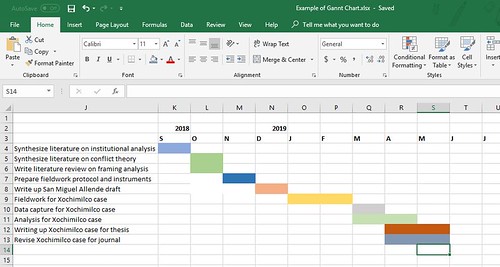
What I suggested to her was to use backcasting techniques to plan backwards from her goal (PhD thesis defense) to intermediate goals. This post explains how I backcast a project https://t.co/wAmyejeoa0 since her dissertation is a 3-papers one, I suggested she uses that model. — Dr Raul Pacheco-Vega (@raulpacheco) October 5, 2018
For Gantt Chart templates, you can see Dr. Emma Sheppard’s here.
Project planning for research students https://t.co/ku7shfB5uL excellent template by @DrESheppard which may be of interest to students from undergrad, Masters and PhD levels. pic.twitter.com/ujQVlYocH7 — Dr Raul Pacheco-Vega (@raulpacheco) September 3, 2018
Here is another resource that you can use to create Gantt Charts.
To do Gantt charts you can use Excel or Microsoft Project (which is how I learned to do them), or Visio (which has been bought by the evil company and is now Microsoft Visio). I liked this detailed approach that uses connectors between milestones and tasks https://t.co/xVjNmM1q7c — Dr Raul Pacheco-Vega (@raulpacheco) October 5, 2018
Hugh Kearns and Maria Gardiner have lots of resources on their site, and have published books on this as well.
I just realised @ithinkwell and @ithinkwellHugh have excellent FREE templates on their website https://t.co/Q859jNiM6Q for PhD students to plan their trajectories, etc. #PhDChat (thanks, Maria and Hugh!) — Dr Raul Pacheco-Vega (@raulpacheco) October 5, 2018
Dr. Patrick Dunleavy’s book “ Authoring a PhD ” is incredible and really does help students who are planning their PhD process. I recommend it to my own doctoral students.
And of course I would be remiss if I forgot to recommend Dr. Ellie Mackin Roberts (my coauthor for a forthcoming book on research planning) and her website. Ellie has A TON of downloadable printables for you to plan your own research. She is fantastic.
Both for doctoral students AND for post-PhD folks, my coauthor Dr. @EllieMackin has an entire website for research planning https://t.co/unXMqmaf2Z she offers FREE downloadable printable templates that you can use to plan your own research. — Dr Raul Pacheco-Vega (@raulpacheco) October 5, 2018
In the end, the process I recommended to my students and that I do myself is – set a target defense date and then work backwards and plan tasks, activities, and intermediate goals. For example, I have asked my students to plan submission dates for their 3 papers (to be sent to journals) and then schedule fieldwork and data analysis accordingly. This process has worked well, and I hope my description of the process will help my students and others!
In a subsequent blog post I’ll describe how to go from long-term goals (submit paper X by Y date) to daily tasks. That blog post will definitely apply to doctoral students and post-PhD folks.
If you liked this blog post, you may also be interested in my Resources for Graduate Students page, and on my reading notes of books I’ve read on how to do a doctoral degree.
You can share this blog post on the following social networks by clicking on their icon.
Posted in academia .
No comments
By Raul Pacheco-Vega – October 6, 2018
0 Responses
Stay in touch with the conversation, subscribe to the RSS feed for comments on this post .
Leave a Reply Cancel Some HTML is OK
Name (required)
Email (required, but never shared)
or, reply to this post via trackback .
About Raul Pacheco-Vega, PhD
Find me online.
My Research Output
- Google Scholar Profile
- Academia.Edu
- ResearchGate
My Social Networks
- Polycentricity Network
Recent Posts
- “State-Sponsored Activism: Bureaucrats and Social Movements in Brazil” – Jessica Rich – my reading notes
- Reading Like a Writer – Francine Prose – my reading notes
- Using the Pacheco-Vega workflows and frameworks to write and/or revise a scholarly book
- On framing, the value of narrative and storytelling in scholarly research, and the importance of asking the “what is this a story of” question
- The Abstract Decomposition Matrix Technique to find a gap in the literature
Recent Comments
- Hazera on On framing, the value of narrative and storytelling in scholarly research, and the importance of asking the “what is this a story of” question
- Kipi Fidelis on A sequential framework for teaching how to write good research questions
- Razib Paul on On framing, the value of narrative and storytelling in scholarly research, and the importance of asking the “what is this a story of” question
- Jonathan Wilcox on An improved version of the Drafts Review Matrix – responding to reviewers and editors’ comments
- Catherine Franz on What’s the difference between the Everything Notebook and the Commonplace Book?
Follow me on Twitter:
Proudly powered by WordPress and Carrington .
Carrington Theme by Crowd Favorite
8 Rules to write a PhD Thesis
Rule 4: make a phd timetable.
A PhD thesis can not be written in one week. Get this through your head. It is hard, maybe even the hardest thing you have to do during your PhD. It is going to be a painful task for most of you (it was for me). So schedule it in a proper time-wise manner. Do not wait until it’s just two weeks before the deadline to start writing. Here is a proposal: make a document with your PhD plan . Write down in that document the important things that need to be done in the last six months of your PhD, preferably in some chronological order. 3 Examples of things to write can be submission of papers, finishing data analyses or other leftover work, writing the thesis, preparing for the defence, sending some important emails, etc. Allocate at least two months of your time for the writing of the thesis . That’s a minimum proposed time frame and it might be far from ideal for you. Time equals money as they say, and that’s definitively the case for the PhD. So you might not want to spend too much of your time in thesis writing. On the other hand, you surely don’t want to underestimate the time that is required for such a colossal task. Therefore, you need to make a well-balanced estimate and plan your thesis writing accordingly. How can then someone derive such an estimate ?
For starters, you need to understand that the exact amount of time that is necessary to finish the thesis writing is hard to predict. The reason for this is that during such a large time period, your life is going to be influenced by a lot of factors. Some of these factors are uncontrollable and there is no way to prepare for them (the phenomenon also simply known as “ life happens ”). Some other factors are directly related to the practical task at hand and can thus be more easily predicted and regulated to your advantage. Using this knowledge, you can make a rough calculation of how much time it will take to write your PhD thesis. I personally think three factors are of significant importance to derive such an estimate. First, the format of the thesis , i.e. a paper-based thesis or a monograph, the latter of which will surely require more time to finish. Second, your personal writing speed , measured in the amount of chapters that you will be able to write on average in a specified time period (usually a week). Third, the number of chapters you need to write. Choosing the format of the thesis should be fairly obvious, based on common practices in your research field, the regulations of your academic institution and the existence or not of published PhD work (papers). Moreover, you should already have a pretty good estimate on the amount of total chapters, based on the modular way of constructing your PhD story as was explained in Rule 3 . Then all that is left, is for you to make an educated guess of your writing speed. The combination of the aforementioned three factors will then help you make a realistic estimation of how long the PhD thesis writing will take.
Let me share with you my personal experience on this matter. My thesis was paper-based. Following the rules in the section During writing , I was writing one to two thesis chapters per week. These were chapter drafts, so definitely not polished material. Therefore, my minimum writing speed was around one chapter per week . Continuing, I had a total of eight chapters to write + the abstract (derived from my initial story structure), which let’s say was equivalent to approximately nine chapters. Worst case scenario, I write one chapter per week, so a total of nine weeks are required. Best case scenario, I write two chapters per week, so a total of five weeks are required (rounding it up). Chapter size plays a huge role as you can probably guess. The proposed estimate of two months time is somewhere between five and nine weeks and closer to the second (the maximum of the two). So, eight weeks, equal to two months, sounded like a good deadline for my writing project. In the end, I finished the thesis writing in seven weeks, which was one week before the deadline. That included also reviewing the edits and comments from my supervisor and several rewrites. The important thing to remember here is that the calculation of your thesis time frame is going to be a personal rough estimate . Therefore, using an average writing speed of one chapter per week without further thought is justifiable (see Rule 7 on how to have more control over this). To summarize, my advice is to 1) calculate the number of chapters you are going to write 2) directly translate that number to weeks and 3) round it up to months. 4
Responsibly follow the time schedule you set up for yourself and be aware to not procrastinate on your thesis writing. This has also been stated more empirically as the notion that “ work expands to fill the time available for its completion ” (Parkinson’s Law). Procrastination can lead to unpleasant and stressful days before the thesis submission, that anyone would gladly dispense with. I have seen people doing rewrites, last minute additions, or otherwise work that could have been done a week or so ago, if properly scheduled. I have heard of people literally running to submit a printed copy in their respective department one hour before the deadline. Doesn’t sound too good to me. It’s a million times better to be prepared and follow your time plan religiously . Try to schedule your thesis writing in an anticipatory manner. This will happen when unfortunate scenarios that you can personally deal with, are managed to a satisfying degree. See also related discussion in the Epilogue .
Make a PhD timetable and allocate a realistic time frame for your thesis writing.
Of course you can make such a plan document from the start of your PhD. I just want to stress here the importance of including in this document what needs to be done during the last stages of your PhD. ↩︎
Remember to round up the resulting number to months! A basic arithmetic example is appropriate here. If you have a total of \(11\) chapters, the time required to write them down would be calculated as follows: \(\frac{11 \text{ chapters }}{1 \text{ chapter/week }}=11 \text{ weeks } \approx 12 \text{ weeks }\) (closest multiple of \(4\) ), which is equal to \(3\) months, assuming that \(1\) month is equal to \(4\) weeks. ↩︎
Purdue Online Writing Lab Purdue OWL® College of Liberal Arts
Thesis and Dissertation: Getting Started

Welcome to the Purdue OWL
This page is brought to you by the OWL at Purdue University. When printing this page, you must include the entire legal notice.
Copyright ©1995-2018 by The Writing Lab & The OWL at Purdue and Purdue University. All rights reserved. This material may not be published, reproduced, broadcast, rewritten, or redistributed without permission. Use of this site constitutes acceptance of our terms and conditions of fair use.
The resources in this section are designed to provide guidance for the first steps of the thesis or dissertation writing process. They offer tools to support the planning and managing of your project, including writing out your weekly schedule, outlining your goals, and organzing the various working elements of your project.
Weekly Goals Sheet (a.k.a. Life Map) [Word Doc]
This editable handout provides a place for you to fill in available time blocks on a weekly chart that will help you visualize the amount of time you have available to write. By using this chart, you will be able to work your writing goals into your schedule and put these goals into perspective with your day-to-day plans and responsibilities each week. This handout also contains a formula to help you determine the minimum number of pages you would need to write per day in order to complete your writing on time.
Setting a Production Schedule (Word Doc)
This editable handout can help you make sense of the various steps involved in the production of your thesis or dissertation and determine how long each step might take. A large part of this process involves (1) seeking out the most accurate and up-to-date information regarding specific document formatting requirements, (2) understanding research protocol limitations, (3) making note of deadlines, and (4) understanding your personal writing habits.
Creating a Roadmap (PDF)
Part of organizing your writing involves having a clear sense of how the different working parts relate to one another. Creating a roadmap for your dissertation early on can help you determine what the final document will include and how all the pieces are connected. This resource offers guidance on several approaches to creating a roadmap, including creating lists, maps, nut-shells, visuals, and different methods for outlining. It is important to remember that you can create more than one roadmap (or more than one type of roadmap) depending on how the different approaches discussed here meet your needs.
- Link to facebook
- Link to linkedin
- Link to twitter
- Link to youtube
- Writing Tips
How to Create a Research Timeline for Your Thesis

- 5-minute read
- 21st May 2023
Beginning a dissertation can feel both thrilling and overwhelming. One of the best things you can do to prepare for the exciting journey of doing a dissertation is to design a comprehensive timeline as your guide. Here we will take you step by step through creating your thesis timeline and provide some example templates, so you’ll be well-prepared to begin your dissertation work.
Reasons for Creating a Timeline
There are many benefits to crafting a detailed dissertation timeline. In addition to helping with time management and meeting crucial deadlines, your timeline will also help you stay motivated by reviewing the tasks you have completed as you progress. A thorough timeline will be valuable during your dissertation proposal and useful if you are applying for grants or other additional funding.
Ste0ps for Creating a Timeline for Your Thesis:
- Research and record all requirements and deadlines.
Before you write out your timeline, ensure you know all of your program’s requirements and deadlines. Academic institutions often require you to complete your dissertation within a specified timeframe.
There are likely several recommended or mandatory deadlines for approval of certain items by your adviser (and possibly the rest of your committee members). Gather all these dates beforehand so you can allot an appropriate amount of time to meet your deadlines.
It will be beneficial to meet with your adviser to understand when you are expected to complete the major phases of your dissertation work and to confirm that there aren’t any other requirements or deadlines that you may not be aware of.
- List all of your tasks and bundle them into phases.
Now that you’ve assembled your dates, working backward from your deadlines is a good rule of thumb. List all of the required tasks that must be completed to meet each milestone, from coming up with your research questions to writing each chapter of your dissertation .
Even though your list will be unique to your research project, it can help to refer to a thesis checklist . It’s also helpful to assemble tasks into different phases (e.g., dissertation proposal, research recruitment). Grouping tasks into phases gives anyone looking at your timeline a quick overview of your research plan.
- Organize your tasks into a schedule and assign task deadlines.
Now it’s time to build your timeline. There are many different free templates available online, from straightforward lists of deliverables to colorful options with room for notes and customization.
Find this useful?
Subscribe to our newsletter and get writing tips from our editors straight to your inbox.
A popular organizational approach for thesis timelines is a Gantt chart , which is a type of bar chart often used in project management in which the length of the bar corresponds to the time the task will take. The best choice for you will depend on the specifics of your research study and personal preferences. Whichever option you select, make sure you can easily edit and revise it as need be.
Sanity-Saving Tips:
● Pay attention to your work style. Some people are more productive when writing in short bursts, while others write better after taking time to get into the zone. Some people choose to start writing parts of their thesis while still conducting research, while others prefer to focus on one phase at a time. Set yourself up for success by reflecting on what type of schedule will help you create the best quality work.
● Schedule breaks. Almost everyone will work better after a well-deserved break. Make sure to schedule regular breaks into your timeline, as well as provide enough time to sleep, eat well, and do anything else you need to do to safeguard your well-being.
● Always have a plan B. Your dissertation is an extensive endeavor with many moving parts. It’s impossible to anticipate and plan for every conceivable event, but it’s helpful to expect something may occur that will cause a deviation from your original timeline. Perhaps study recruitment takes longer than you expected, or one of your committee members gets sick and you have to postpone your dissertation proposal. After you draft your timeline, check that it is not so strict that any disruption will cause a total derailment of your plan. Aim to strike a balance between goals that will inspire you to progress steadfastly and have some leeway in your timeline for the inevitable curveball that life will throw at you somewhere along the way.
Following these three steps will help you draft a timeline to steer the course of your dissertation work: research and record all requirements and deadlines; work backward from your dissertation deadline and assemble your task lists; and organize your tasks into a timeline.
Don’t forget to include ample time for editing and proofreading your dissertation . And if you are interested in any help from us, you can try a sample of our services for free . Best of luck in writing your dissertation!
Share this article:
Post A New Comment
Got content that needs a quick turnaround? Let us polish your work. Explore our editorial business services.
9-minute read
How to Use Infographics to Boost Your Presentation
Is your content getting noticed? Capturing and maintaining an audience’s attention is a challenge when...
8-minute read
Why Interactive PDFs Are Better for Engagement
Are you looking to enhance engagement and captivate your audience through your professional documents? Interactive...
7-minute read
Seven Key Strategies for Voice Search Optimization
Voice search optimization is rapidly shaping the digital landscape, requiring content professionals to adapt their...
4-minute read
Five Creative Ways to Showcase Your Digital Portfolio
Are you a creative freelancer looking to make a lasting impression on potential clients or...
How to Ace Slack Messaging for Contractors and Freelancers
Effective professional communication is an important skill for contractors and freelancers navigating remote work environments....
3-minute read
How to Insert a Text Box in a Google Doc
Google Docs is a powerful collaborative tool, and mastering its features can significantly enhance your...

Make sure your writing is the best it can be with our expert English proofreading and editing.
- Share on twitter
- Share on facebook
10 tips for writing a PhD thesis
Ingrid curl shares simple rules for keeping your work clear and jargon-free.
- Share on linkedin
- Share on mail

Writing up a PhD can often take place in a frenzy of activity in the last few months of your degree study, after years of hard work. But there are some steps that you can take to increase your chances of success.
- Do not be daunted by the task of “writing up”. Work on the text as your PhD takes shape, remember that all writers need editing, and help yourself by using these basic tips to make life easier. Read what great writers say about how to write before you start, and take their advice to heart. There is no dark art to clear, concise work; it is mostly a result of editing, and editing again. Above all, keep Elmore Leonard’s advice in mind: “If it reads like writing…rewrite it.”
- Plan the structure of your thesis carefully with your supervisor. Create rough drafts as you go so that you can refine them as you become more focused on the write-up. Much of writing comprises rewriting so be prepared to rework each chapter many times. Even Ernest Hemingway said: “The first draft of everything is shit.”
- Academic writing does not have to be dry. Inject some flair into your work. Read advice on writing and remember George Orwell’s words in Why I Write : “Never use the passive where you can use the active”; and Mark Twain’s on adjectives: “When you catch an adjective, kill it.” If you prefer, Stephen King said: “The road to hell is paved with adverbs.”
- Do not write up in chronological order. Work on each chapter while it is fresh in your mind or pertinent to what you are doing at that moment, but come back to it all later and work it up into a consistent, coherent piece, restructuring sections where necessary.
- Think carefully about your writing. Write your first draft, leave it and then come back to it with a critical eye. Look objectively at the writing and read it closely for style and sense. Look out for common errors such as dangling modifiers, subject-verb disagreement and inconsistency. If you are too involved with the text to be able to take a step back and do this, then ask a friend or colleague to read it with a critical eye. Remember Hemingway’s advice: “Prose is architecture, not interior decoration.” Clarity is key.
- Most universities use a preferred style of references. Make sure you know what this is and stick to it. One of the most common errors in academic writing is to cite papers in the text that do not then appear in the bibliography. All references in your thesis need to be cross-checked with the bibliography before submission. Using a database during your research can save a great deal of time in the writing-up process. Helpful software includes EndNote or Paperpile. Managing your bibliography from day one may seem obsessive but it will save you a great deal of time and stress by the end of the PhD process.
- Use a house style. Professional publications such as Times Higher Education use a house style guide to ensure consistency in spelling. For example, do not use both -ise spellings and -ize spellings, stick to British spelling and be consistent when referring to organisations or bodies. Because dictionaries vary in their use of hyphenation, use one dictionary and stick to it throughout the writing process. If you consult the New Oxford Dictionary for Writers and Editors , you will note the extraordinary number of words with alternative spellings. It can also be a very useful guide to preferred spellings, use of italicisation and foreign phrases.
- Take care when quoting from other sources. Ensure you note whether the italic emphasis is in the original and take careful notes when you are collecting quotes for your thesis. Transcribe them accurately to save work later and keep original spellings (even if they differ from your chosen style) to ensure fidelity to your source.
- Think about plagiarism. If you are quoting from works, quote from them accurately and paraphrase where necessary for your argument. This is where careful note-taking and use of references is invaluable and will help you to avoid even inadvertently plagiarising another work.
- Remember that your thesis is your chance to present your work in the best possible light. Consider your opening paragraphs, entice your reader with your writing and above all be clear about your hypothesis and your conclusion. Append material where it adds value but not where it merely bulks out your work. Consider your reader at all times. This is your chance to showcase your work.
If you stick to these simple rules, your writing will be clear and jargon-free. Above all, take to heart Orwell’s advice: “Never use a foreign phrase, a scientific word, or a jargon word if you can think of an everyday English equivalent.”
Ingrid Curl is associate editor of Times Higher Education , and a former PhD student.
Register to continue
Why register?
- Registration is free and only takes a moment
- Once registered, you can read 3 articles a month
- Sign up for our newsletter
Or subscribe for unlimited access to:
- Unlimited access to news, views, insights & reviews
- Digital editions
- Digital access to THE’s university and college rankings analysis
Already registered or a current subscriber? Login
Related articles

How to submit a PhD thesis
The final few months of a PhD can often be the hardest, so here are a few tips from a doctoral candidate who recently submitted her thesis

NIH raises postdoctoral salaries, but below target
Top US funding agency manages record increase in key programme for younger scientists, and sees gains in overall equity, while absorbing net cut in its annual budget

How to win the citation game without becoming a cynic
Boosting your publication metrics need not come at the expense of your integrity if you bear in mind these 10 tips, says Adrian Furnham

Black vice-chancellor eyes new generation of minority researchers
David Mba creates fully funded PhD studentships after taking reins at Birmingham City University
Featured jobs

- Manuscript Preparation
Know How to Structure Your PhD Thesis
- 4 minute read
- 34.8K views
Table of Contents
In your academic career, few projects are more important than your PhD thesis. Unfortunately, many university professors and advisors assume that their students know how to structure a PhD. Books have literally been written on the subject, but there’s no need to read a book in order to know about PhD thesis paper format and structure. With that said, however, it’s important to understand that your PhD thesis format requirement may not be the same as another student’s. The bottom line is that how to structure a PhD thesis often depends on your university and department guidelines.
But, let’s take a look at a general PhD thesis format. We’ll look at the main sections, and how to connect them to each other. We’ll also examine different hints and tips for each of the sections. As you read through this toolkit, compare it to published PhD theses in your area of study to see how a real-life example looks.
Main Sections of a PhD Thesis
In almost every PhD thesis or dissertation, there are standard sections. Of course, some of these may differ, depending on your university or department requirements, as well as your topic of study, but this will give you a good idea of the basic components of a PhD thesis format.
- Abstract : The abstract is a brief summary that quickly outlines your research, touches on each of the main sections of your thesis, and clearly outlines your contribution to the field by way of your PhD thesis. Even though the abstract is very short, similar to what you’ve seen in published research articles, its impact shouldn’t be underestimated. The abstract is there to answer the most important question to the reviewer. “Why is this important?”
- Introduction : In this section, you help the reviewer understand your entire dissertation, including what your paper is about, why it’s important to the field, a brief description of your methodology, and how your research and the thesis are laid out. Think of your introduction as an expansion of your abstract.
- Literature Review : Within the literature review, you are making a case for your new research by telling the story of the work that’s already been done. You’ll cover a bit about the history of the topic at hand, and how your study fits into the present and future.
- Theory Framework : Here, you explain assumptions related to your study. Here you’re explaining to the review what theoretical concepts you might have used in your research, how it relates to existing knowledge and ideas.
- Methods : This section of a PhD thesis is typically the most detailed and descriptive, depending of course on your research design. Here you’ll discuss the specific techniques you used to get the information you were looking for, in addition to how those methods are relevant and appropriate, as well as how you specifically used each method described.
- Results : Here you present your empirical findings. This section is sometimes also called the “empiracles” chapter. This section is usually pretty straightforward and technical, and full of details. Don’t shortcut this chapter.
- Discussion : This can be a tricky chapter, because it’s where you want to show the reviewer that you know what you’re talking about. You need to speak as a PhD versus a student. The discussion chapter is similar to the empirical/results chapter, but you’re building on those results to push the new information that you learned, prior to making your conclusion.
- Conclusion : Here, you take a step back and reflect on what your original goals and intentions for the research were. You’ll outline them in context of your new findings and expertise.
Tips for your PhD Thesis Format
As you put together your PhD thesis, it’s easy to get a little overwhelmed. Here are some tips that might keep you on track.
- Don’t try to write your PhD as a first-draft. Every great masterwork has typically been edited, and edited, and…edited.
- Work with your thesis supervisor to plan the structure and format of your PhD thesis. Be prepared to rewrite each section, as you work out rough drafts. Don’t get discouraged by this process. It’s typical.
- Make your writing interesting. Academic writing has a reputation of being very dry.
- You don’t have to necessarily work on the chapters and sections outlined above in chronological order. Work on each section as things come up, and while your work on that section is relevant to what you’re doing.
- Don’t rush things. Write a first draft, and leave it for a few days, so you can come back to it with a more critical take. Look at it objectively and carefully grammatical errors, clarity, logic and flow.
- Know what style your references need to be in, and utilize tools out there to organize them in the required format.
- It’s easier to accidentally plagiarize than you think. Make sure you’re referencing appropriately, and check your document for inadvertent plagiarism throughout your writing process.
PhD Thesis Editing Plus
Want some support during your PhD writing process? Our PhD Thesis Editing Plus service includes extensive and detailed editing of your thesis to improve the flow and quality of your writing. Unlimited editing support for guaranteed results. Learn more here , and get started today!

- Publication Process
Journal Acceptance Rates: Everything You Need to Know

- Publication Recognition
How to Make a PowerPoint Presentation of Your Research Paper
You may also like.

Make Hook, Line, and Sinker: The Art of Crafting Engaging Introductions

Can Describing Study Limitations Improve the Quality of Your Paper?

A Guide to Crafting Shorter, Impactful Sentences in Academic Writing

6 Steps to Write an Excellent Discussion in Your Manuscript

How to Write Clear and Crisp Civil Engineering Papers? Here are 5 Key Tips to Consider

The Clear Path to An Impactful Paper: ②

The Essentials of Writing to Communicate Research in Medicine

Changing Lines: Sentence Patterns in Academic Writing
Input your search keywords and press Enter.


Writing Your Dissertation: Setting a Daily Dissertation Schedule

Do not underestimate how much time it will take to write your dissertation. Many graduate students spend much of their valuable time researching and collecting data and put off the arduous task of writing about what they’ve done until the last minute. These students inevitably scramble to synthesize thoughts and ideas on paper, making (what is to most) the already stressful process of writing even more difficult than it has to be because of time constraints. You can avoid the last-minute pressures of writing your dissertation if you set realistic daily, weekly, monthly, and yearly deadlines for yourself in the form of a dissertation schedule. However, you will be the most prepared when it comes time to submit your dissertation to your committee if you commit to keep your dissertation plan in mind every day. The following are things to consider when setting a daily dissertation schedule:
Set a regular daily dissertation schedule for yourself, accounting for class time and personal time (i.e., going to dinner with friends, taking a nap, doing yoga, and relaxing in front of the TV), and stick to it. It may seem extreme to be so rigid with time, but every minute of the day counts when you are in graduate school and when you have so many responsibilities to balance. Amid all your responsibilities, choose a specific block of time for each day that you will dedicate specifically to writing your dissertation. When choosing your daily dissertation schedule, consider what time of day you are most productive (i.e., morning or evening). Also, remember to schedule occasional days off; this will help you recharge your writing battery and be better able to review what you have already written.
Choose a productive writing space. If you know that you cannot productively write from home because pets, children, other household members, or TV shows will distract you, then don’t work from home. Go anywhere—a coffee shop, a library, your dissertation buddy’s house—where you can find an electrical outlet, good internet connection, and anything else you deem is necessary to facilitate your daily writing. However, before you can definitively select a productive daily writing space, you must also consider how you like to write: Are you more productive when you sit and write for long continuous periods of time, or do you prefer to write a little and then move around and ponder? Do you like to work with background noise, or is absolute silence what you need to write your best? The ultimate goal is to select a location where you can consistently go to feel absolutely comfortable writing during your daily dissertation schedule.
Click here to cancel reply.
You must be logged in to post a comment.
Copyright © 2024 PhDStudent.com. All rights reserved. Designed by Divergent Web Solutions, LLC .

UCL Ear Institute
- Typical timetable for full-time PhD student (3 ...

Typical timetable for full-time PhD student (3 Year)
Students and studentships.
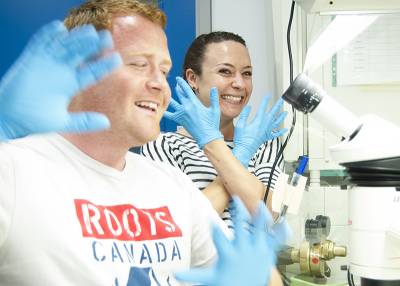
Find out what our current cohort of research students are getting up to, where our past students have ended up and whether we have any Studentships currently advertised on our jobs page:
- Current students
- Alumni testimonials
- Studentships (Jobs page)
- Resources for students/supervisors

How to plan, structure and write every chapter in your PhD
In this collection, we’ll walk you through each chapter of your thesis. You’ll learn what goes where and how it fits together.

The PhD Discussion Chapter: What It Is & How To Write It
Your PhD discussion chapter is your thesis's intellectual epicenter. Think of it as the scholarly equivalent of a courtroom closing argument, where you summarise the evidence and make your case. Perhaps that’s why it’s so tricky - the skills you need in your...

Everything you wanted to know about structuring your PhD but were too afraid to ask
Understanding how to structure your PhD is tough. It helps to break it down into four distinct sections. In this guide, we explain how.

How to find the thread that runs through your PhD thesis
You probably worry about finding the thread that runs through the PhD thesis. In this guide we walk you through what’s required.

How to edit a PhD thesis (without going mad)
Your thesis takes a lot of time to research, ideate, and write. Here’s how to properly edit a PhD thesis such that you impress your examiners and achieve even greater success.

The 9 most effective ways to achieve PhD success
Writing a PhD is physically, intellectually and emotionally daunting. You may spend each day doubting yourself, not sure if you’re making the right choices and unsure whether you’ve got what it takes. During my life, I’ve helped thousands of PhD students like...

How To Structure A PhD Thesis
Struggling to understand what goes where? Let us walk you through a non-nonsense guide that’ll teach you how to structure a PhD thesis.

The difference between empirical and discussion chapters (and how to write them)
There is a very important distinction that needs to be made between the empirical and discussion sections/chapters. It is a common misconception that the empirical chapters are the place for your analysis. Often this confuses the reader.

Five tips to improve your PhD thesis
Regardless of what stage of the writing process you are at, there are five overarching tips you need to keep in mind if you want to improve your PhD thesis.

What are you doing and how are you doing it? Articulating your aims and objectives.
How long does it take the person reading your thesis to understand what you’re doing and how you’re doing it? If the answer is anything other than ’in the the opening lines of the thesis’, keep reading.

Learn how to write a PhD proposal that will stand out from the rest
When stripped down to its basic components, the PhD proposal explains the what and the why of your research. What it will be about and why it will be important.

Easily understand how to write a PhD thesis introduction
Get the introduction right and the rest of your dissertation will follow. Mess it up and you’ll be struggling to catch up. The introduction is the place to factually recount what it is you will be discussing in the thesis. Learn more in this detailed guide.

Last impressions count – writing your PhD thesis conclusion
The conclusion is the last thing your examiner will read before they write their viva report. You need to make sure it stands out.

What is a dissertation abstract and how do I write one for my PhD?
Don’t underestimate how hard it is to write a PhD thesis abstract. When I wrote mine I though it’d be straightforward. Far from it. It’s tricky. You have to condense hundred of pages and years of work into a few hundred words.

Russian (dolls) to the rescue – how to structure an argument in your PhD
At the core of the PhD are arguments. Lots of them. Some more important and some very specific. When you understand how to structure an argument, your thesis reads clearly and logically. If you don’t the reader ends up confused and your thesis suffers.

Drowning in a sea of authors – How to be critical in a PhD literature review.
Don’t get lost in a sea of authors when you write your PhD literature review. Instead be critical. In this guide we explain how.

Wrestling an elephant into a cupboard: how to write a PhD literature review in nine easy steps
When I was writing my PhD I hated the literature review. I was scared of it. I thought it would be impossible to grapple. So much so that it used to keep me up at night. Now I know how easy it can be and I’m sharing my top tips with you today.

A Template To Help You Structure Your PhD’s Theoretical Framework Chapter
In this guide, I explain how to use the theory framework template. The focus is on the practical things to consider when you’re working with the template and how you can give your theory framework the rockstar treatment.

How To Structure A PhD With Our PhD Writing Template
Our PhD Writing Template allows you to visualise your PhD on one page. Here we explain how to fill it in and how it can help you structure each chapter.

Eureka! When I learnt how to write a theoretical framework
The theoretical framework is so important, but so misunderstood. Here we explain it is in simple terms: as a toolbox.
Explore Other PhD Knowledge Base Collections
Eight collections of free resources to help you along the phd journey.

Mastering your theory and literature review chapters

How to structure and write every chapter of the PhD

How to stay motivated and productive

Techniques to improve your writing and fluency

Advice on maintaining good mental health

Resources designed for non-native English speakers

Explore our back-catalogue of motivational advice
Each week we send out a short, motivational email to over 4,000 students. Here you can sign up and access the archive.

A free one-page PhD structure template
PhD Thesis Guide
This phd thesis guide will guide you step-by-step through the thesis process, from your initial letter of intent to submission of the final document..
All associated forms are conveniently consolidated in the section at the end.
Deadlines & Requirements
Students should register for HST.ThG during any term in which they are conducting research towards their thesis. Regardless of year in program students registered for HST.ThG in a regular term (fall or spring) must meet with their research advisor and complete the Semi-Annual PhD Student Progress Review Form to receive credit.
Years 1 - 2
- Students participating in lab rotations during year 1, may use the optional MEMP Rotation Registration Form , to formalize the arrangement and can earn academic credit by enrolling in HST.599.
- A first letter of intent ( LOI-1 ) proposing a general area of thesis research and research advisor is required by April 30th of the second year of registration.
- A second letter of intent ( LOI-2 ) proposing a thesis committee membership and providing a more detailed description of the thesis research is required by April 30th of the third year of registration for approval by the HST-IMES Committee on Academic Programs (HICAP).
Year 4
- Beginning in year 4, (or after the LOI-2 is approved) the student must meet with their thesis committee at least once per semester.
- Students must formally defend their proposal before the approved thesis committee, and submit their committee approved proposal to HICAP by April 30 of the forth year of registration.
- Meetings with the thesis committee must be held at least once per semester.
HST has developed these policies to help keep students on track as they progress through their PhD program. Experience shows that students make more rapid progress towards graduation when they interact regularly with a faculty committee and complete their thesis proposal by the deadline.
Getting Started
Check out these resources for finding a research lab.
The Thesis Committee: Roles and Responsibilities
Students perform doctoral thesis work under the guidance of a thesis committee consisting of at least three faculty members from Harvard and MIT (including a chair and a research advisor) who will help guide the research. Students are encouraged to form their thesis committee early in the course of the research and in any case by the end of the third year of registration. The HST IMES Committee on Academic Programs (HICAP) approves the composition of the thesis committee via the letter of intent and the thesis proposal (described below).
Research Advisor
The research advisor is responsible for overseeing the student's thesis project. The research advisor is expected to:
- oversee the research and mentor the student;
- provide a supportive research environment, facilities, and financial support;
- discuss expectations, progress, and milestones with the student and complete the Semi-Annual PhD Student Progress Review Form each semester;
- assist the student to prepare for the oral qualifying exam;
- guide the student in selecting the other members of the thesis committee;
- help the student prepare for, and attend, meetings of the full thesis committee, to be held at least once per semester;
- help the student prepare for, and attend, the thesis defense;
- evaluate the final thesis document.
The research advisor is chosen by the student and must be a faculty member of MIT* or Harvard University and needs no further approval. HICAP may approve other individuals as research advisor on a student-by-student basis. Students are advised to request approval of non-faculty research advisors as soon as possible. In order to avoid conflicts of interest, the research advisor may not also be the student's academic advisor. In the event that an academic advisor becomes the research advisor, a new academic advisor will be assigned.
The student and their research advisor must complete the Semi-Annual PhD Student Progress Review during each regular term in order to receive academic credit for research. Download Semi Annual Review Form
*MIT Senior Research Staff are considered equivalent to faculty members for the purposes of research advising. No additional approval is required.
Thesis Committee Chair
Each HST PhD thesis committee is headed administratively by a chair, chosen by the student in consultation with the research advisor. The thesis committee chair is expected to:
- provide advice and guidance concerning the thesis research;
- oversee meetings of the full thesis committee, to be held at least once per semester;
- preside at the thesis defense;
- review and evaluate the final thesis document.
The thesis committee chair must be well acquainted with the academic policies and procedures of the institution granting the student's degree and be familiar with the student's area of research. The research advisor may not simultaneously serve as thesis committee chair.
For HST PhD students earning degrees through MIT, the thesis committee chair must be an MIT faculty member. A select group of HST program faculty without primary appointments at MIT have been pre-approved by HICAP to chair PhD theses awarded by HST at MIT in cases where the MIT research advisor is an MIT faculty member.**
HST PhD students earning their degree through Harvard follow thesis committee requirements set by the unit granting their degree - either the Biophysics Program or the School of Engineering and Applied Sciences (SEAS).
** List of non-MIT HST faculty approved to chair MIT thesis proposals when the research advisor is an MIT faculty member.
In addition to the research advisor and the thesis committee chair, the thesis committee must include one or more readers. Readers are expected to:
- attend meetings of the full thesis committee, to be held at least once per semester;
- attend the thesis defense;
Faculty members with relevant expertise from outside of Harvard/MIT may serve as readers, but they may only be counted toward the required three if approved by HICAP.
The members of the thesis committee should have complementary expertise that collectively covers the areas needed to advise a student's thesis research. The committee should also be diverse, so that members are able to offer different perspectives on the student's research. When forming a thesis committee, it is helpful to consider the following questions:
- Do the individuals on the committee collectively have the appropriate expertise for the project?
- Does the committee include at least one individual who can offer different perspectives on the student's research? The committee should include at least one person who is not closely affiliated with the student's primary lab. Frequent collaborators are acceptable in this capacity if their work exhibits intellectual independence from the research advisor.
- If the research has a near-term clinical application, does the committee include someone who can add a translational or clinical perspective?
- Does the committee conform to HST policies in terms of number, academic appointments, and affiliations of the committee members, research advisor, and thesis committee chair as described elsewhere on this page?
[Friendly advice: Although there is no maximum committee size, three or four is considered optimal. Committees of five members are possible, but more than five is unwieldy.]
Thesis Committee Meetings
Students must meet with their thesis committee at least once each semester beginning in the fourth year of registration. It is the student's responsibility to schedule these meetings; students who encounter difficulties in arranging regular committee meetings can contact Julie Greenberg at jgreenbe [at] mit.edu (jgreenbe[at]mit[dot]edu) .
The format of the thesis committee meeting is at the discretion of the thesis committee chair. In some cases, the following sequence may be helpful:
- The thesis committee chair, research advisor, and readers meet briefly without the student in the room;
- The thesis committee chair and readers meet briefly with the student, without the advisor in the room;
- The student presents their research progress, answers questions, and seeks guidance from the members of the thesis committee;
Please note that thesis committee meetings provide an important opportunity for students to present their research and respond to questions. Therefore, it is in the student's best interest for the research advisor to refrain from defending the research in this setting.
Letters of Intent
Students must submit two letters of intent ( LOI-1 and LOI-2 ) with applicable signatures.
In LOI-1, students identify a research advisor and a general area of thesis research, described in 100 words or less. It should include the area of expertise of the research advisor and indicate whether IRB approval (Institutional Review Board; for research involving human subjects) and/or IACUC approval (Institutional Animal Care and Use Committee; for research involving vertebrate animals) will be required and, if so, from which institutions. LOI-1 is due by April 30 of the second year of registration and and should be submitted to HICAP, c/o Traci Anderson in E25-518.
In LOI-2, students provide a description of the thesis research, describing the Background and Significance of the research and making a preliminary statement of Specific Aims (up to 400 words total). In LOI-2, a student also proposes the membership of their thesis committee. In addition to the research advisor, the proposed thesis committee must include a chair and one or more readers, all selected to meet the specified criteria . LOI-2 is due by April 30th of the third year of registration and should be submitted to HICAP, c/o Traci Anderson in E25-518.
LOI-2 is reviewed by the HST-IMES Committee on Academic Programs (HICAP) to determine if the proposed committee meets the specified criteria and if the committee members collectively have the complementary expertise needed to advise the student in executing the proposed research. If HICAP requests any changes to the proposed committee, the student must submit a revised LOI-2 for HICAP review by September 30th of the fourth year of registration. HICAP must approve LOI-2 before the student can proceed to presenting and submitting their thesis proposal. Any changes to the thesis committee membership following HICAP approval of LOI-2 and prior to defense of the thesis proposal must be reported by submitting a revised LOI-2 form to HICAP, c/o tanderso [at] mit.edu (Traci Anderson) . After final HICAP approval of LOI-2, which confirms the thesis committee membership, the student may proceed to present their thesis proposal to the approved thesis committee, as described in the next section.
Students are strongly encouraged to identify tentative thesis committee members and begin meeting with them as early as possible to inform the direction of their research. Following submission of LOI-2, students are required to hold at least one thesis committee meeting per semester. Students must document these meetings via the Semi- Annual PhD Student Progress Review form in order to receive a grade reflecting satisfactory progress in HST.ThG.
Thesis Proposal and Proposal Presentation
For MEMP students receiving their degrees through MIT, successful completion of the Oral Qualifying Exam is a prerequisite for the thesis proposal presentation. For MEMP students receiving their degrees through Harvard, the oral qualifying exam satisfies the proposal presentation requirement.
Proposal Document
Each student must present a thesis proposal to a thesis committee that has been approved by HICAP via the LOI-2 and then submit a full proposal package to HICAP by April 30th of the fourth year of registration. The only exception is for students who substantially change their research focus after the fall term of their third year; in those cases the thesis proposal must be submitted within three semesters of joining a new lab. Students registering for thesis research (HST.THG) who have not met this deadline may be administratively assigned a grade of "U" (unsatisfactory) and receive an academic warning.
The written proposal should be no longer than 4500 words, excluding references. This is intended to help students develop their proposal-writing skills by gaining experience composing a practical proposal; the length is comparable to that required for proposals to the NIH R03 Small Research Grant Program. The proposal should clearly define the research problem, describe the proposed research plan, and defend the significance of the work. Preliminary results are not required. If the proposal consists of multiple aims, with the accomplishment of later aims based on the success of earlier ones, then the proposal should describe a contingency plan in case the early results are not as expected.
Proposal Presentation
The student must formally defend the thesis proposal before the full thesis committee that has been approved by HICAP.
Students should schedule the meeting and reserve a conference room and any audio visual equipment they may require for their presentation. To book a conference room in E25, please contact Joseph Stein ( jrstein [at] mit.edu (jrstein[at]mit[dot]edu) ).
Following the proposal presentation, students should make any requested modifications to the proposal for the committee members to review. Once the committee approves the proposal, the student should obtain the signatures of the committee members on the forms described below as part of the proposal submission package.
[Friendly advice: As a professional courtesy, be sure your committee members have a complete version of your thesis proposal at least one week in advance of the proposal presentation.]
Submission of Proposal Package
When the thesis committee has approved the proposal, the student submits the proposal package to HICAP, c/o Traci Anderson in E25-518, for final approval. HICAP may reject a thesis proposal if it has been defended before a committee that was not previously approved via the LOI-2.
The proposal package includes the following:
- the proposal document
- a brief description of the project background and significance that explains why the work is important;
- the specific aims of the proposal, including a contingency plan if needed; and
- an indication of the methods to be used to accomplish the specific aims.
- signed research advisor agreement form(s);
- signed chair agreement form (which confirms a successful proposal defense);
- signed reader agreement form(s).
Thesis Proposal Forms
- SAMPLE Title Page (doc)
- Research Advisor Agreement Form (pdf)
- Chair Agreement Form (pdf)
- Reader Agreement Form (pdf)
Thesis Defense and Final Thesis Document
When the thesis is substantially complete and fully acceptable to the thesis committee, a public thesis defense is scheduled for the student to present his/her work to the thesis committee and other members of the community. The thesis defense is the last formal examination required for receipt of a doctoral degree. To be considered "public", a defense must be announced to the community at least five working days in advance. At the defense, the thesis committee determines if the research presented is sufficient for granting a doctoral degree. Following a satisfactory thesis defense, the student submits the final thesis document, approved by the research advisor, to Traci Anderson via email (see instructions below).
[Friendly advice: Contact jrstein [at] mit.edu (Joseph Stein) at least two weeks before your scheduled date to arrange for advertising via email and posters. A defense can be canceled for insufficient public notice.]
Before the Thesis Defense
Committee Approves Student to Defend: The thesis committee, working with the student and reviewing thesis drafts, concludes that the doctoral work is complete. The student should discuss the structure of the defense (general guidelines below) with the thesis committee chair and the research advisor.
Schedule the Defense: The student schedules a defense at a time when all members of the thesis committee will be physical present. Any exceptions must be approved in advance by the IMES/HST Academic Office.
Reserve Room: It is the student's responsibility to reserve a room and any necessary equipment. Please contact imes-reservation [at] mit.edu (subject: E25%20Room%20Reservation) (IMES Reservation) to reserve rooms E25-140, E25-141, E25-119/121, E25-521.
Final Draft: A complete draft of the thesis document is due to the thesis committee two weeks prior to the thesis defense to allow time for review. The thesis should be written as a single cohesive document; it may include content from published papers (see libraries website on " Use of Previously Published Material in a Thesis ") but it may not be a simple compilation of previously published materials.
Publicize the Defense: The IMES/HST Academic Office invites the community to attend the defense via email and a notice on the HST website. This requires that the student email a thesis abstract and supplemental information to jrstein [at] mit.edu (Joseph Stein) two weeks prior to the thesis defense. The following information should be included: Date and time, Location, (Zoom invitation with password, if offering a hybrid option), Thesis Title, Names of committee members, with academic and professional titles and institutional affiliations. The abstract is limited to 250 words for the poster, but students may optionally submit a second, longer abstract for the email announcement.
Thesis Defense Guidelines
Public Defense: The student should prepare a presentation of 45-60 minutes in length, to be followed by a public question and answer period of 15–30 minutes at discretion of the chair.
Committee Discussion: Immediately following the public thesis presentation, the student meets privately with the thesis committee and any other faculty members present to explore additional questions at the discretion of the faculty. Then the thesis committee meets in executive session and determines whether the thesis defense was satisfactory. The committee may suggest additions or editorial changes to the thesis document at this point.
Chair Confirms Pass: After the defense, the thesis committee chair should inform Traci Anderson of the outcome via email to tanderso [at] mit.edu (tanderso[at]mit[dot]edu) .
Submitting the Final Thesis Document
Please refer to the MIT libraries thesis formatting guidelines .
Title page notes. Sample title page from the MIT Libraries.
Program line : should read, "Submitted to the Harvard-MIT Program in Health Sciences and Technology, in partial fulfillment of the the requirements for the degree of ... "
Copyright : Starting with the June 2023 degree period and as reflected in the MIT Thesis Specifications , all students retain the copyright of their thesis. Please review this section for how to list on your title page Signature Page: On the "signed" version, only the student and research advisor should sign. Thesis committee members are not required to sign. On the " Accepted by " line, please list: Collin M. Stultz, MD, PhD/Director, Harvard-MIT Program in Health Sciences and Technology/ Nina T. and Robert H. Rubin Professor in Medical Engineering and Science/Professor of Electrical Engineering and Computer Science.
The Academic Office will obtain Professor Stultz's signature.
Thesis Submission Components. As of 4/2021, the MIT libraries have changed their thesis submissions guidelines and are no longer accepting hard copy theses submissions. For most recent guidance from the libraries: https://libguides.mit.edu/mit-thesis-faq/instructions
Submit to the Academic Office, via email ( tanderso [at] mit.edu (tanderso[at]mit[dot]edu) )
pdf/A-1 of the final thesis should include an UNSIGNED title page
A separate file with a SIGNED title page by the student and advisor, the Academic Office will get Dr. Collin Stultz's signature.
For the MIT Library thesis processing, fill out the "Thesis Information" here: https://thesis-submit.mit.edu/
File Naming Information: https://libguides.mit.edu/
Survey of Earned Doctorates. The University Provost’s Office will contact all doctoral candidates via email with instructions for completing this survey.
Links to All Forms in This Guide
- MEMP Rotation Form (optional)
- Semi-Annual Progress Review Form
- Letter of Intent One
- Letter of Intent Two
Final Thesis
- HST Sample thesis title page (signed and unsigned)
- Sample thesis title page (MIT Libraries)
We use cookies on this site to enhance your experience
By clicking any link on this page you are giving your consent for us to set cookies.
A link to reset your password has been sent to your email.
Back to login
We need additional information from you. Please complete your profile first before placing your order.
Thank you. payment completed., you will receive an email from us to confirm your registration, please click the link in the email to activate your account., there was error during payment, orcid profile found in public registry, download history, how to start writing from day one of your phd.
- Charlesworth Author Services
- 15 January, 2020
What do I write? How do I start writing? Is my writing good enough? If you’ve found yourself asking these questions, you are not alone. One of the most common struggles among PhD students, at various stages of their doctoral research, is actually starting writing .
Since writing makes up a very large part – if not the entirety – of a PhD, this is something that all doctoral students will eventually have to do, so it is good to start as early on in the PhD as you can.
Some supervisors will set you small writing tasks in the early stages of your PhD, such as writing a summary of the main ideas from the literature you are reading, a book review, or a detailed discussion of your research questions. Speak to your supervisor early on in your PhD for suggestions of what you can write to help you develop your ideas at the different stages of your research. Where possible, submit this work to them for detailed feedback.
You do not necessarily have to start writing full chapters. Often, what you write in the first year or so of your PhD may not be included in the thesis itself. However, this early writing is important for helping you reflect upon the existing literature, clarify the directions of your research, develop your thought process, and become accustomed to academic writing, especially within your discipline.
If your working relationship with your supervisor does not include as much of an emphasis on writing, you can still maintain a regular writing schedule for yourself. Here are a few writing prompts you can use to start writing:
- Keep a research journal: Make a point of writing regularly in your research journal, for example, every day or once a week. As this is not a formal piece of work, there is more room for you to write about fledging thoughts and explore your ideas. You can use this as a space for writing your reflections on things you have recently read, or to work through questions or problems that you are dealing with in your research . This journal can also be used to make fieldnotes when you’re conducting fieldwork or experiments – these notes will be very useful to come back to when you reach the later stages of analysis and writing up.
- Read (and reread) things that excite you : If you’re finding it hard to find anything to write about, return to the few books or articles that you know you always enjoy reading. Read and reread them , looking out for the main ideas that excite you and that are relevant to your own research. Extract a quote or a paragraph and use that as a starting basis for reflecting upon how a particular theory or idea relates to your work, what questions it brings up for your own research, what aspects you agree or disagree with, and why. Sometimes, a single quotation can inspire a very interesting, complex piece of writing that will offer you interesting new insights and move your research in novel directions.
- Write essays, not chapters : If you are still at an early stage of your PhD, it will probably feel too daunting to begin writing a thesis chapter, especially as your research is still not fully developed. However, you can still begin writing on a smaller scale. Think of these writing assignments as essays instead of full chapters, and set yourself workable, realistic word counts (not more than 1000-3000 words). Some examples include a mini literature review of the texts you have read so far, or a discussion of the methodological approaches and methods you plan to use. The writing may feel rudimentary and not particularly developed, but at this stage, it can be useful for clarifying your directions and helping you see what areas you need to address or read more on.
Don’t waste time trying to create ‘perfect’ pieces of writing or worrying about the technicalities of spelling, grammar and punctuation. These early writing drafts will not be formally assessed and finer details can be addressed much later on in your PhD by engaging external help.
Maximise your publication success with Charlesworth Author Services.
Charlesworth Author Services, a trusted brand supporting the world’s leading academic publishers, institutions and authors since 1928.
To know more about our services, visit: Our Services
Share with your colleagues
Related articles.

A simple guide to begin Publishing during Your PhD
Charlesworth Author Services 03/01/2020 00:00:00

How can I reach the level of academic writing needed for a PhD?
Charlesworth Author Services 22/04/2021 00:00:00

Preparing and writing your PhD Research Proposal
Charlesworth Author Services 02/08/2021 00:00:00
Related webinars

Bitesize Webinar: Effective paper writing for early career researchers: Module 1: Writing an effective PhD thesis
Charlesworth Author Services 02/03/2021 00:00:00

Bitesize webinar: Effective paper writing for early career researchers: Module 2: Writing an effective masters' dissertation

Bitesize webinar: Effective paper writing for early career researchers: Module 3: The right mindset for academic paper writing

Bitesize Webinar: Effective paper writing for early career researchers: Module 4: How to sell yourself as a researcher

Managing your time as a researcher
Charlesworth Author Services 27/04/2021 00:00:00

How to find your best work rhythm as a PhD student
Charlesworth Author Services 07/05/2020 00:00:00

Optimising your career and personal development during the PhD
Charlesworth Author Services 18/03/2021 00:00:00

May 15, 2024
Tips and Resources for a Successful Summer of Dissertation Writing
By Yana Zlochistaya
Summer can be a strange time for graduate students. Gone are the seminars and workshops, the student clubs, and the working group, that structured the semester and provided us with a sense of community. Instead, we’re faced with a three-month expanse of time that can feel equal parts liberating and intimidating. This double-edged freedom is only exacerbated for those of us in the writing stage of our dissertation, when isolation and a lack of discipline can have a particularly big impact. For those hoping not to enter another summer with lofty plans, only to blink and find ourselves in August disappointed with our progress, we’ve compiled some tips and resources that can help.
According to Graduate Writing Center Director Sabrina Soracco, the most important thing you can do to set yourself up for writing success is to clarify your goals. She recommends starting this process by looking at departmental requirements for a completed dissertation. Consider when you would like to file and work backwards from that point, determining what you have to get done in order to hit that target. Next, check in with your dissertation committee members to set up an accountability structure. Would they prefer an end-of-summer update to the whole committee? A monthly check-in with your chair or one of your readers? Setting up explicit expectations that work for you and your committee can cut through the aimlessness that comes with a major writing project.
For those early on in their dissertation-writing process, a committee meeting is also a valuable opportunity to set parameters. “One of the problems with the excitement for the discipline that happens post-quals is that it results in too many ideas,” says Director. Soracco. Your committee members should give you input on productive research directions so that you can begin to hone in on your project. It is also important to remember that your dissertation does not have to be the end-all-and-be-all of your academic research. Ideas that do not fit into its scope can end up becoming conference papers or even book chapters.
Once you have a clear goal that you have discussed with your committee, the hard part begins: you have to actually write. The Graduate Writing Center offers several resources to make that process easier:
- The Graduate Writing Community. This is a totally remote, two-month program that is based on a model of “gentle accountability.” When you sign up, you are added to a bCourses site moderated by a Graduate Writing Consultant. At the beginning of the week, everyone sets their goals in a discussion post, and by the end of the week, everyone checks in with progress updates. During the week, the writing consultants offer nine hours of remote synchronous writing sessions. As a writing community member, you can attend whichever sessions work best for your schedule. All that’s required is that you show up, set a goal for that hour, and work towards that goal for the length of two 25-minute Pomodoro sessions . This year’s summer writing community will begin in June. Keep your eye on your email for the registration link!
- Writing Consultations : As a graduate student, you can sign up for an individual meeting with a Graduate Writing Consultant. They can give you feedback on your work, help you figure out the structure of a chapter, or just talk through how to get started on a writing project.
- Independent Writing Groups: If you would prefer to write with specific friends or colleagues, you can contact Graduate Writing Center Director Sabrina Soracco at [email protected] so that she can help you set up your own writing group. The structure and length of these groups can differ; often, members will send each other one to five pages of writing weekly and meet the next day for two hours to provide feedback and get advice. Sometimes, groups will meet up not only to share writing, but to work in a common space before coming together to debrief. Regardless of what the groups look like, the important thing is to create a guilt-free space. Some weeks, you might submit an outline; other weeks, it might be the roughest of rough drafts; sometimes, you might come to a session without having submitted anything. As long as we continue to make progress (and show up even when we don’t), we’re doing what we need to. As Director Soracco puts it, “it often takes slogging through a lot of stuff to get to that great epiphany.”
Yana Zlochistaya is a fifth-year graduate student in the Department of Comparative Literature and a Professional Development Liaison with the Graduate Division. She previously served as a co-director for Beyond Academia.
- Thesis format
- Using thesis time-table
- Writing a simple graduation essay outline
- Cohesive dissertation paper

- Thesis Writing Tips
- Dissertation Drafts
- Picking an educational leadership topic
- Picking a PhD dissertation topic
- Psychology problems to explore
- Uncommon history phd topics
- Convincing topics for phd
- Leadership dissertation topics
- Management thesis ideas
- Computer science dissertation topics
- Choose the best dissertation topic
- Composing great education thesis topics
- Marketing thesis topics
- Topics for criminal justice thesis
- Picking a Health thesis topic
- Inventing MBA dissertation topics
- Marketing dissertation topics on brands
- Undergraduate Psychology thesis ideas
- Corporate finance dissertation topics
- Architecture thesis topic ideas
- Prompts for an Advertising thesis
- Banking system dissertation topics
- Computer science PhD thesis prompts
- Choosing topics about The Middle East
- Feminism: choosing dissertation titles
- Obesity thesis paper topics
- Where to get help with a thesis
- Thesis editing and proofreading
- Fighting procrastination
- Presenting your thesis
- Thesis writing step-by-step guide
- English thesis prompts
- Writing walk-through
- Online theses databases
- Dissertation literature section hints
- Thesis proposal defense
- How to order a dissertation
- Thesis editing assistance
- Raising your productivity
- Eliminating plagiarism
- How to write an abstract
- Dissertation acknowledgments
- A search for a sample introduction
- Sample APA thesis search
- Getting a sample methodology for a thesis
- Finding sample theses on Nursing
- MBA thesis writing: title insights
- A sample thesis methodology: museums
- Psychology dissertation proposal
- Crafting an excellent thesis
- Composing a nursing dissertation
- Dissertation proposal rough draft
- Creating a historical thesis paper
- Formatting an APA thesis cover page
- Looking for a good thesis sample
- MBA summary composing tricks
- Title page of a dissertation
- Astronomy thesis proposal
- Geography dissertation introduction
- Web design thesis proposal
- Recent articles:
- Catching reader's attention
- Providing background information
Make Up a Time-table For Your Master's Thesis Writing
We have discussed before the importance of having good time management skills when approaching any academic writing. This is because as you move along in your academic career the writing assignments that you will be expected to complete will become increasingly more elaborate. Eventually, you will get to the point where you will no longer be considered a student but a scholar. The writing contributions that you complete will not just be for grading but they will be your addition to the academic community for other students to study from. This may seem a little intimidating right now, especially if you still find that you struggle to complete a basic writing assignment in a timely fashion. This is why it is important for you to get into the habit of working from a schedule when you write early on. Working from a schedule will eliminate the need for coffee induced all nighters and help your plan and organize your writing of an extended period of time. As your projects become longer and more intense you will know how to establish a reasonable timetable for getting them done. That way, when the day comes to compose your custom thesis you will be well practiced in the art of scheduling out your writing projects.
Creating A Timetable For Your Writing
Every student should have day planner that they use to write down everything then need to get done. This is a good habit to get into if you intend to begin scheduling your writing. Basically, using a scheduler you can work out a reasonable timeframe for completing your writing assignment or major project that only has you working for a few hours a day. This is much better than working for hours on end trying to get done right before the deadline. When it comes to your master thesis this kind of writing habit just won’t do. You’ll need to get a sense of how quickly you write, how much time you require for research, and how long it typically takes for you to get your document proofread and edited.
At the end of the day learning to manage your writing time now will benefit you plenty in the future. A master thesis project can take over a year to complete! By then, you will want to know how to effectively schedule out your time. This will help to remove much of the stress associated with completing such an intense paper.
Thesis writing guide
Our writers

Our writers are graduates and professors of top US, UK and Canadian schools
You have an exclusive opportunity to have your project reviewed by a team of professional writers and editors.
Our editorial team

Popular articles & manuals
- Finding a cheap thesis writing service
- Law dissertation infusive ideas
- Finding a business management thesis sample
- Doctoral paper composing advice
- PhD writing advice
- Thesis on history & philosophy of science
Featured dissertation editor

We host the best PhD and Doctoral writers on the net. You have a great opportunity to have your project reviewed and marked by an expert.
- ©1998-2024 WDassociation.org
- Thesis proposal
- Structuring
- Introduction
All rights reserved. Do not copy.
Congrats to PhD student, Xuyi Zhao for winning a Bloom fellowship for her dissertation write up
- May 2, 2024
Grad Xuyi Zhao has won a Bloom Fellowship from the Graduate School of Arts and Sciences for her dissertation write up! Congratulations Xuyi!
View all posts

IMAGES
VIDEO
COMMENTS
Example: Planning year 2 of a 3-year PhD. Maria completed her first round of data collection according to plan, and starts the second year of her PhD with a lot of material. In her second year, she will focus on turning this data into two journal articles. Months 1-2: Maria works on her data analysis.
A dissertation timeline includes a series of milestones that leads up to the dissertation defense, revisions, and final submission of your dissertation. Constructing an outline of every step in the dissertation process, including rough estimates of how long each will take, will give you a realistic picture of where you are in the process at any ...
A PhD research plan or schedule can be prepared using the GANTT chart which includes a month, semester or year-wise planning of the entire PhD research work. First, enlist goals and objectives. It's not about your research objective enlisted in your proposal. I'm talking about the objectives of your PhD.
My Reading Notes of Books on How to Write a Doctoral Dissertation/How to Conduct PhD Research; Writing a Thesis (Undergraduate or Masters) or a Dissertation (PhD) Resources for Undergraduate Students. Reading strategies for undergraduates; Social Media in Academia; Surviving and Thriving in Academia. Resources for Job Seekers in the Academic Market
Rule 4: Make a PhD timetable. A PhD thesis can not be written in one week. Get this through your head. It is hard, maybe even the hardest thing you have to do during your PhD. It is going to be a painful task for most of you (it was for me). So schedule it in a proper time-wise manner. Do not wait until it's just two weeks before the deadline ...
Thesis and Dissertation: Getting Started. The resources in this section are designed to provide guidance for the first steps of the thesis or dissertation writing process. They offer tools to support the planning and managing of your project, including writing out your weekly schedule, outlining your goals, and organzing the various working ...
A thorough timeline will be valuable during your dissertation proposal and useful if you are applying for grants or other additional funding. Ste0ps for Creating a Timeline for Your Thesis: Research and record all requirements and deadlines. Before you write out your timeline, ensure you know all of your program's requirements and deadlines.
A Guide to Writing a PhD Thesis. A PhD thesis is a work of original research all students are requiured to submit in order to succesfully complete their PhD. The thesis details the research that you carried out during the course of your doctoral degree and highlights the outcomes and conclusions reached. The PhD thesis is the most important ...
A PhD thesis (or dissertation) is typically 60,000 to 120,000 words ( 100 to 300 pages in length) organised into chapters, divisions and subdivisions (with roughly 10,000 words per chapter) - from introduction (with clear aims and objectives) to conclusion. The structure of a dissertation will vary depending on discipline (humanities, social ...
Academic writing does not have to be dry. Inject some flair into your work. Read advice on writing and remember George Orwell's words in Why I Write: "Never use the passive where you can use the active"; and Mark Twain's on adjectives: "When you catch an adjective, kill it." If you prefer, Stephen King said: "The road to hell is ...
Last month, we offered suggestions on how to prepare for your thesis defence: Decide whether you need more research results, sketch out a plan for those experiments and for writing thesis chapters, and--importantly--get your supervisor's support for that plan.Now it's time to wrap things up in the lab and start writing. Writing a thesis is easier said than done, of course, and you have plenty ...
Work with your thesis supervisor to plan the structure and format of your PhD thesis. Be prepared to rewrite each section, as you work out rough drafts. Don't get discouraged by this process. It's typical. Make your writing interesting. Academic writing has a reputation of being very dry.
1) Make an assertion about your style of interpretation. 2) Capture the attention of your reader. 3) Know what your readers anticipate and provide them with answers. 4) Challenge your peers about the severity of the research problem and put for-ward your proposal for a solution.
schedule time at the end of writing your dissertation to proof-read or have someone else proof-read it Save your files as much as possible - always make two backups! Take time off! I always worked better on my dissertation after a break. Start writing earlier rather than later - gives you more time for drafts and editing. Do not write and ...
Amid all your responsibilities, choose a specific block of time for each day that you will dedicate specifically to writing your dissertation. When choosing your daily dissertation schedule, consider what time of day you are most productive (i.e., morning or evening). Also, remember to schedule occasional days off; this will help you recharge ...
Writing needs to be done daily - even if you only write 200 words. Your writing schedule might be for two hours from 8.15 a.m until 10.15 a.m Monday to Friday or from 6.30 pm to 8.30 pm each evening (take the weekends off. Life is too short to work weekends.) Or you might work better in 15 minute bursts.
Writing of upgrade report and upgrade viva takes place . Transfer of registration from MPhil to PhD (between 9-18 months, but as. early as reasonable). 24 months: Submission and assessment of second year progress report on research log. Agreement of thesis structure and strict timetable. for thesis writing
A Template To Help You Structure Your PhD's Theoretical Framework Chapter. In this guide, I explain how to use the theory framework template. The focus is on the practical things to consider when you're working with the template and how you can give your theory framework the rockstar treatment. Use our free tools, guides and templates to ...
Thesis Proposal and Proposal Presentation. Thesis Defense and Final Thesis Document. Links to All Forms in This Guide. This PhD Thesis Guide will guide you step-by-step through the thesis process, from your initial letter of intent to submission of the final document. All associated forms are conveniently consolidated in the section at the end.
Here are a few writing prompts you can use to start writing: Keep a research journal: Make a point of writing regularly in your research journal, for example, every day or once a week. As this is not a formal piece of work, there is more room for you to write about fledging thoughts and explore your ideas.
Research proposal examples. Writing a research proposal can be quite challenging, but a good starting point could be to look at some examples. We've included a few for you below. Example research proposal #1: "A Conceptual Framework for Scheduling Constraint Management".
Once you have a clear goal that you have discussed with your committee, the hard part begins: you have to actually write. The Graduate Writing Center offers several resources to make that process easier: The Graduate Writing Community. This is a totally remote, two-month program that is based on a model of "gentle accountability.".
Then the sheet is set up to automatically create a Gantt chart like this one: I've colour coded the chart based on three PhD Aims and general thesis writing. You'll notice that the dark bars indicate my percentage progress like I mentioned earlier, so if a bar is half way across, then the task is 50% complete.
Basically, using a scheduler you can work out a reasonable timeframe for completing your writing assignment or major project that only has you working for a few hours a day. This is much better than working for hours on end trying to get done right before the deadline. When it comes to your master thesis this kind of writing habit just won't ...
chair during all phases of the dissertation writing. Exams • Doctoral students at Texas A&M University are required to complete the following exams: o Preliminary Exam: For the preliminary exam, the student will present a written dissertation proposal and, upon acceptance by the committee, schedule an oral exam on the contents.
225-439-5633. [email protected]. The LSU Alumni Association 2024 Distinguished Dissertation Award in Science, Engineering and Technology has been awarded to Dimitrios Kranas from Thessaloniki, Greece, who joined LSU and the Hearne Institute of Theoretical Physics under the mentorship of Associate Professor of Physics Ivan Agullo in 2018.
Grad Xuyi Zhao has won a Bloom Fellowship from the Graduate School of Arts and Sciences for her dissertation write up! Congratulations Xuyi! Congrats to PhD student, Xuyi Zhao for winning a Bloom fellowship for her dissertation write up. Posted 1 week ago in Student News. View all posts